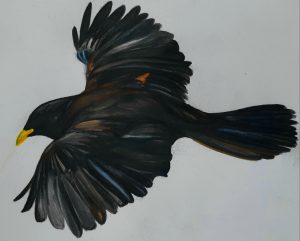The Gardener
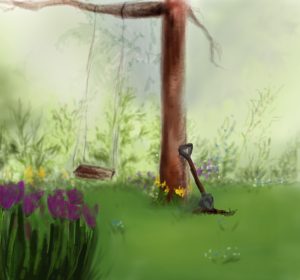
Illustration by India Hibbs
You push your finger against the grubby bell and are not surprised that it’s broken. The grey front door has no window, no knocker, only a spy hole and a slit of a letter box. You hear music from inside. You knock. First, sharp with knuckles, then pounding, with your fist. Still nothing. You fiddle with your lanyard and glance back to your car, parked up onto the pavement behind you. It’s been a long day.
Gingerly, you push at the rusted metal flap and call through the letter box.
“Hello? It’s Sam. From Children’s Services? Mrs Phillips are you there? Hello!”
You can hear someone singing along at the back of the house, a deep voice.
“All I wanna, Be no Other, Be together…” Beyonce.
Mr Phillips.
Funny you were listening to that song on the way here.
“Mr Phillips? It’s Sam…”
Suddenly footsteps running down stairs and someone is behind the door.
“Dad, it’s the social, dad, can I open the door?” and you hear the child fumbling with the door catch and behind her someone coming.
“Out of my way, April!” His voice demands immediate response.
The door opens and he is in front of you. You can hear children’s cartoons in the background.
You hold your ID card on its lanyard out towards him, but he ignores it and looks you up and down. You assess him too. He is slightly taller than you, wiry with a ‘Peaky Blinders’ haircut and an indigo dot, high on his right cheek.
“Mr Phillips, Hi. I’m Sam, we met at the Initial Child Protection Conference. Do you remember me saying we had an appointment today so that I could chat to April and Jordan, at home?”
He looks at you, his head at a slight angle as if he was deciphering what you just said.
“Nah, I’d forgotten that like.”
“Oh well, I’m here now, can I come in? Hi April!”
April, still wearing her school sweat shirt, is balancing on one leg, on the second step of the uncarpeted stairs. She holds the bannister and leans out from it, watching her father. She smiles shyly at you and glances back to her dad.
You say, “I’ve seen April and Jordan at school over the last couple of weeks to introduce myself, Mr Phillips, and I’ve brought some colouring in to do with them today, if that’s ok?”
Mr Phillips steps back from the door.
“You’d better come in, then. The missus is out but I’ll put the kettle on if you want.”
You edge into the narrow hallway past a row of coats on pegs and a neat line of shoes. Smiling at April you reach out to touch the girls arm, giving it a quick, friendly rub.
The hallway is painted a tired beige and marked randomly with what appears to be splashes of old tea or maybe juice, lower down, scuff marks from shoes. The door shuts behind you and the stains are less distinct. There are no pictures or photographs, although you spot two nails knocked into the wall at head height.
Mr Phillips leads the way into the living room.
“Jordan, switch off the telly, social’s here.”
A large screen TV mounted to the wall dominates the room along with two sofas, one pushed back, against the wall opposite and the other in front of the window. Jordan is curled up there, thumb in his mouth and attention fixed on the noisy cartoon.
“Jordan!” his father barks and grabs the remote, switching off the screen.
Jordan begins to whine.
You step in front of the boy and squat down.
“Hi Jordan, remember me. I’ve come with that colouring in I promised.”
Jordan’s frown twists to a sleepy smile, his thumb still in his mouth.
The living room is immaculately tidy. You feel concerned. Had the children not been present, there would be little to suggest their existence at all.
“Can we colour in here, Mr Phillips. We can use the coffee table.”
“Aye, but divn’t make a mess, she’s obsessed with keeping the place clean, their mam. I’m starting the kids’ tea, so I’ll be in the kitchen. “
You kneel on the floor and begin to take pictures and colouring pencils out of your bag.
“Great. Thanks, Mr Phillips… actually, is it ok if I call you Dave?”
“Aye”
“Will Ruth be home soon?”
“Nah, she’s gone to see her sister.”
You turn to him and notice April loitering in the doorway looking uncertain.
“Come on love”, you encourage the girl.” Come and sit with me.”
“Is Ruth ok?” you ask Dave above the child’s head.
Dave looks towards the kitchen.
“Aye, her sister’s poorly. She’s gone to make their tea. She’ll be late home.”
You settle down with the children. As you each chose pictures, you ask questions about their day at school and about their friends and teachers mentioned at your last meeting with them. They discuss their picture choices and share coloured pencils.
You enjoy these ‘getting to know you’ sessions, the easiest component of your Family Assessment. The children have begun to relax with you and now, April leans against your arm, busy colouring in a picture of a fairground. She has kept within the lines meticulously and is colouring each balloon in a bunch held by a showman she had already dressed in a black top hat and red coat.
Still perturbed at the sparseness of the room you ask them about their favourite toys.
Jordan says that he likes “Fortnite” which he plays on his dad’s phone. April twists her finger through her hair and puts down her pencil.
“Do you want to see our bedroom, Sam? Mummy painted my bit with flowers and Jordan’s bit with stars. And then I can show you all my pictures I’ve drawn. We stuck them on the wall. We keep our toys there too, if you want to see them.”
You want to whoop.
“Let’s just make sure that your dad is ok with that,” you caution. You don’t want to be accused of snooping.
“I’m tired of colouring. I want a drink,” Jordan announces jumping to his feet and scattering pencils.
An old transistor beside the cooker plays music quietly. You see that although worn, the kitchen is, as the living room, absolutely spotless. Dave fries sausages in the pan and nods his agreement to April taking you upstairs. As you turn to leave the kitchen, you notice a cracked pane of glass in the kitchen door.
“I’ll get that kettle on for you coming down again”, he says, watching you leave.
You follow April up the stairs and into a bright single room. Your feet sink into carpet, dark blue and shot through with yellow, red and white streaks. Windows, overlooking the back garden, are framed with rainbow patterned curtains. April guides you to admire her pictures stuck to the wall and other pieces of craft that she has made. As she chatters you notice, with relief, board games, cars and lorries and other toys in boxes under the children’s bunk bed.
April tells you to cover your eyes and turns you to stand in front of the bunk bed. At first you don’t notice, but then gasp as you look at the wall the bed is pushed against. On the top half, a hand painted picture of Jordan, his face a concentration of joy. He straddles a space rocket which soars up into the darkness of the universe, past planets with rings and translucent mists and stars, some shooting their luminous trails through space. You imagine how this looks to the little boy at night.
You bend down, to where April sleeps. There, a garden, beautiful with lilies, violets, crocuses and daffodils growing up between blades of grass. On a swing, attached to the strong bough of an apple tree, April. High in the sky, legs outstretched before her, her face focussed and her hand extended to grasp a rosy apple as she swings.
“April, did your mummy paint this?”
April looks delighted at the impact the wall has had on you.
“It’s so beautiful, I don’t think I’ve ever seen anything like it.”
You picture Ruth at the Child Protection Conference. Her pale face strained. Her thin arms wrapped about her body as she pleaded with the gathered professionals. How she’d wept, begging them to believe that she was well and that she did not need the medication her doctor had prescribed. The drugs that numbed her mind.
You will take photographs of this mural once you have permission from Dave and Ruth. You feel that this is something that must not be ignored in your assessment.
“Is yours a picture of your garden?” you ask.
You move towards the window and immediately regret the question as you look out on patchy uneven grass, a withered tree in the middle of it, black bin bags piled against the back fence and an abandoned spade.
Someone had been digging.
“Is dad making a veg patch, or a flower bed for your mum? That will be fun for you to help with.”
You feel the air shift in the room and turn to April. The crocheted square she had lifted to show you, hangs forgotten in her hand.
“April… what’s the matter?”
You kneel down to the child. Her face, so animated seconds before, is pale and distant. She glances at you and looks away. She wraps her arms around her thin frame and looks at you again. The look of her mother.
“Dad dug it. I watched him do it and when she… when mum, came out and saw, she ran back in but he caught her. I saw him pull her and she screamed but he put his hand over her mouth…It’s my secret. They don’t know what I saw… daddy and Jordan, they don’t.”
“April, where’s your mum?”
You feel cold and sick. April’s face is shell shocked and you know, absolutely, that this little girl has witnessed something terrible. You glance back into the garden at the dug earth.
April’s breath comes in bursts. She shakes her head, you think, trying to lose those images and you pull her to you. April pushes away to continue.
“Daddy put the soil on her. I saw him. With his spade. The light outside was on and when he went inside the light went off and I watched the dark. I waited but he didn’t come back.”
She drops her voice to a whisper and submits to your arms.
“Then the light came back on and her hands were moving, like they were growing up from the soil. And then she was pushing it all off her head. And coughing. And she climbed out. And she was wiping it out of her eyes and coughing more. It was falling out of her hair and I saw it in the light and I was scared. I wanted her to go away because I thought daddy would see her again and push her back. “
The voice in your ear is urgent, she can hardly catch her breath such is the need to pour all of this from her. Your head spins with your responsibility. Nothing could have prepared you for this. From somewhere inside you hear yourself make soothing noises against this barrage.
April begins to shake. “Mummy got out of the ground and then she went to the back door. I couldn’t see anymore but I could hear her crying, trying to get in. Banging on the glass. Daddy came and he shouted because it was broke. And he let her in. I heard them in the hall and the picture of me and Jordan crashed off the wall. Then daddy came up and made a bath. I jumped into bed and pretended I was asleep.”
“April, your tea’s ready!” Dave’s voice comes from the bottom of the stairs.
April’s eyes round.” It’s my secret,” she says her eyes boring into yours.
“Sam, I have a cuppa for you too.”
~
She sits on the stool at the end of the table while the kids eat. She is small, looks like she thinks she’s too good for us. I give her a mug of tea. She thanks me but doesn’t look at me. She talks to Jordan but looks at April. I lift my mug to drink. Jordan is talking to her about seeing the moon through his uncle’s telescope and she is only half listening. She should be taking notes about that, or something. I’m not having that.
“Everything ok then, Sam?” I ask. “Did you see what you needed to, upstairs? Our Jordan has always loved his rockets and space and that. Haven’t you, son?”
Jordan smiles mushed sausage at me. His mam would’ve telt him to keep his mouth closed.
Sam doesn’t look like she’s left school, never mind being qualified enough to come in and break up a decent family. I watch her struggling to meet my eyes, but she does it.
“Sounds like it. You know ever so much Jordan”, she smiles at him.
There is something else in her eyes, something I didn’t see when she arrived.
“April and Jordan’s bedroom is just lovely too. I can’t get over the mural…”
‘Ever so much’, ‘Just lovely’, ‘mural’…fuckin’ poncy witch.
“It’s great that you and Ruth were able to do it up for them. Are you hoping to redecorate the rest of the house?”
She sounds so fake I could laugh in her face.
“Oh aye, bit by bit. You kna how it is. We wanted to get the kids sorted first. Would that be something you can help us with, like. Maybe some money for the stair carpet.”
As I’m talking she’s looking between me and the back door. She’s seen the broken glass. I know she wants to ask me about it. I can see her cogs turning, whirring, whipping up some huge fuckin’ conspiracy theory. Aye, she’ll sharp have that down on paper.
I tell the kids to hurry up. Jordan asks if mummy is coming home tonight and April drops her fork on the floor. Sam jumps up and they both scrabble under the table for it. Sam rubs April’s back. Will she leave off pawing at me bairn. They climb back up but the air starts to crack around me.
I stare at the kids. She stares at the broken pane. She gulps her tea, I sip mine. Jordan asks for more water. I take their plates and tell them they can have just half an hour of telly. It sounds good, not too much. I can tell that Sam wants to go with them. I offer her more tea. She says she has had enough. I brush past her, to pick up the plates. Too close. She flinches and tries to cover it up. She slips off the stool and I am in front of her.
“Do you need to ask me anything?” I say. Her eyes are fear. I could eat them.
“About the door?” I say.
She recovers herself and hands me her empty mug. She is watching our hands.
“Well, I did wonder how it got broken, and… is it safe?” she mumbles, her voice breaking a little.
“Yeah, me and Ruth, we had a bit of an …accident”
I could laugh again, I’m baiting her. She’s breathing fast now and I imagine how it would feel to put my fist around her neck, watch her squawk like a fuckin’ pigeon. I could go with that, after all the hole is dug outside and me kids is glued to the telly, but then I hear the door open and Ruth cries “I’m back!”
The kids yell “Mam”, and April wails “Mam, mam” and she’s sobbing and Sam’s wide eyes and open mouth tell me the lot.
Sue Pearson is a current MA Creative writing student having stepped away from a career in law. She began writing 2 years ago and enjoys creating short stories.Through the MA she has also had the opportunity to explore writing for Children and Young Adults and creating poetry. She is currently working on a Young Adult novel, a collection of Short Stories and some poems. She lives in Newcastle with her husband and two children. This is her first publication and her ambition is to have more
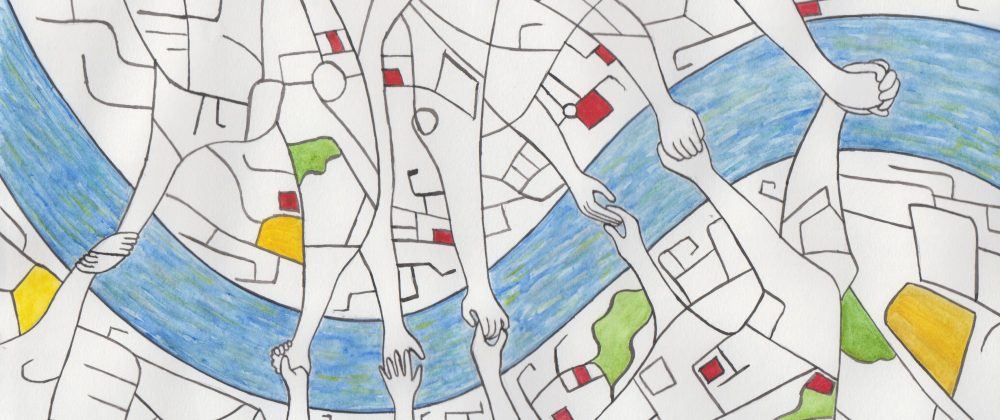
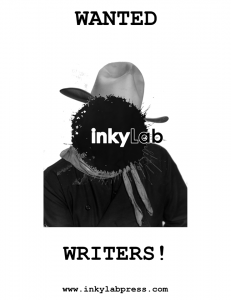
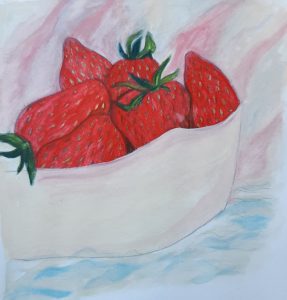
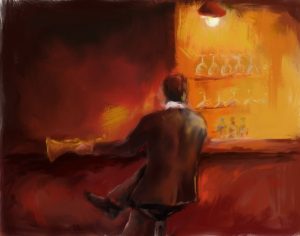 – illustration by India Hibbs
– illustration by India Hibbs